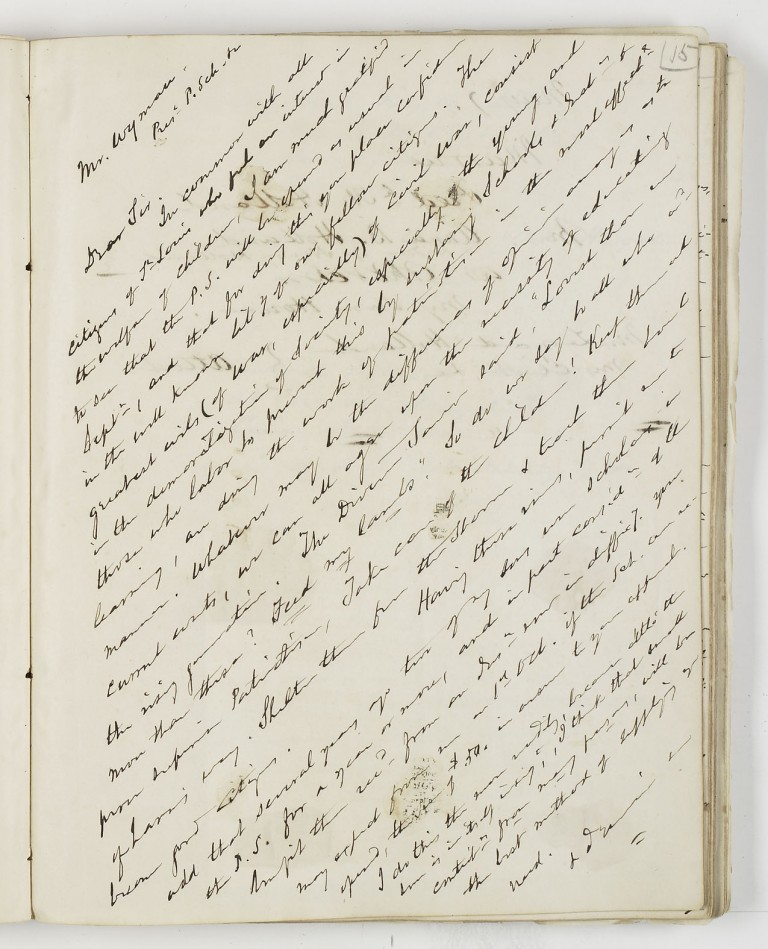Public School Reform in Wartime: From the Desk of William Greenleaf Eliot
In 1861, St. Louis’s public school system was threatened by the outbreak of the Civil War. As a member of the school district’s board of directors, William Greenleaf Eliot wrote to its president, Edward Wyman, and asked that he keep the schools open during wartime. As it turns out, the schools had been closed earlier that year, without any sign of reopening for St. Louis’s twelve thousand students. In seeking a reversal of Wyman’s decision to close the schools, Eliot was also trying to prevent such an occurrence from ever happening again.
Mr. Wayman, President Public Schools –
Dear Sir, In common with all citizens of St. Louis who feel an interest in the welfare of children, I am much gratified to see that the Public Schools will be open as usual in September, and that for doing this you place confidence in the well known ability of our fellow citizens. The greatest evils (of war, especially) of Civil War, consist in the demoralization of Society, especially of the young, and those who labor to prevent this by sustaining Schools & Institutions of learning, are doing the work of patriotism in the most effective manner. Whatever may be the differences of opinion among us as to current events, we can all agree upon the necessity of educating the rising generation. The Divine Savior said, “Lovest thou me more than these? Feed my lambs.” So do we say to all who are proven superior Patriots, Take care of the child! Keep them out of harm’s way. Shelter them from the storm & teach them how to become good citizens.
Having these views, permit me to add that several years ago two of my sons where scholars in the PS [public schools] for a year or more, and in part consider it the [illegible] they received from an Institution ever in difficulty. You may expect from me on 1st Oct[ober]. if the Sch[ools] are re-opened, the sum of $50 in answer to your appeal. I do this the more readily, because altho the sum is in itself insignificant, I think that small contributions from many persons, will be the best method of supplying your need.
William Greenleaf Eliot Personal Papers, Series 01, Notebook 6, page 15.
St. Louis’s school district was formed when Missouri was made a territory in 1812, a congressional act accompanied by a statement that any land not reserved for private individuals or the military could be used for schools. After being voted on the board of directors in 1848, Eliot was able to raise public school taxes in St. Louis, an event that greatly expanded administrative operations, increased the district’s budget, and allowed for the opening of more schools. His tax hikes even won out against great public disapproval after St. Louis’s port burnt down after a massive fire in 1849.
Once again, Eliot’s vocation as a Unitarian minister influenced his ardent desire to provide free schooling for the city’s children and adolescents. At the foundation of Eliot’s thought was the need for education. If a society had access to good education, then its moral problems could be more easily solved. For quality education to remain in place, the institutional support would also need to stay intact. This necessity is even more important when society is subjected to the evils and destruction of war.
Eliot also mentions that two of his own sons were students in the St. Louis public school system, and even despite the near-constant problems the district faced, the boys still received an education. It was Eliot’s hope that through strengthening the institutional infrastructure of the school district, other children’s education would not be similarly interrupted.
To find out more about Eliot, please consult the William Greenleaf Eliot Personal Papers located at the Archives and this research guide.
You can read more of Eliot’s online collection by perusing his materials at Missouri Digital Heritage.
Sources
- Miranda Rectenwald and Sonya Rooney, “‘Shall we be one strong united people…’” The Confluence, Spring/Summer 2011;
- Rev. Dr. Earl K. Holt III, William Greenleaf Eliot: Conservative Radical.

